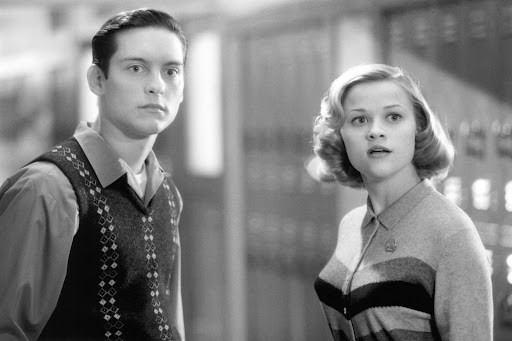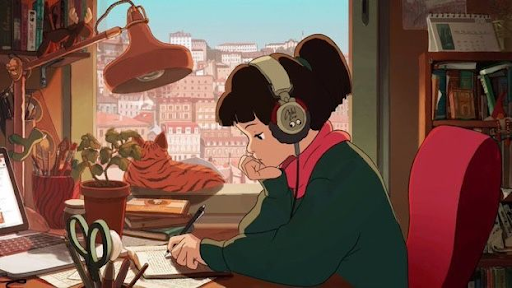Disclaimer: This film is rated PG-13 and may not be suitable for younger viewers
The “Golden Age” of television saw the rise of the family sitcom, with notable examples including Leave It To Beaver (1957-1963), Father Knows Best (1954-1960), I Love Lucy (1951-1957), and The Dick Van Dyke Show (1961-1966). While these sitcoms varied in plot, one common thread was innocence. These characters were always good people, with any conflict they faced getting solved by the end of the episode. All parents were happily married; all characters were perfectly content. To put it simply, the worlds these shows lived in were idyllic and unattainable. These shows are often looked back on fondly, with some holding the belief that TV needs to return to a more innocent time. But what if we could actually live the life portrayed in these Golden Age sitcoms? The 1998 cult classic Pleasantville answers this question head-on, while also teaching viewers important lessons about human flourishing.
I discovered Pleasantville while scrolling mindlessly through every streaming service I own, desperately trying to find something to watch. That was when I saw a cover with two familiar faces on it: Toby Maguire and Reese Witherspoon. Naturally, I decided to give this movie a chance. I soon found myself pausing my TV screen halfway through and asking myself why I hadn’t seen this before.
Pleasantville follows two teenage siblings, Jennifer and David, who lead drastically different social lives. Jennifer (Witherspoon) is extremely popular at school and is widely considered “cool,” while her brother, David (Maguire), goes unnoticed. As a result, he spends his time watching reruns of a vintage black and white family sitcom from the 1950s, called “Pleasantville.” David essentially uses it as a form of escapism from his undesirable reality: he has a broken family, not many friends, and a sister with whom he doesn’t get along. His favorite show, however, depicts a seemingly perfect family: two parents, siblings who love each other, and a quaint, simple suburban town complete with a white picket fence in every yard. The film gets its kickstart when David and Jennifer begin fighting over their new TV remote, and all of a sudden find themselves sucked into the fictional universe of “Pleasantville” as the two main characters, with no way of escaping. I can confidently say that I did not expect to enjoy it as much as I did.
Pleasantville as a whole is superb. The film itself fools the viewer. Like the fictional 1950s sitcom “Pleasantville,” this movie presents itself as a one dimensional and simplistic comedy. And it is hilarious; I can attest that the visual gags were pretty clever (A five-course family breakfast served before school, a team of firemen whose only job is to get cats out of trees, the school basketball team who makes every shot they take, and married couples who sleep in separate twin beds, to name a few). But the film is so much more than that.
In order to fit in, David and Jennifer have to blend in with their surroundings and conform to the society of Pleasantville, which they easily do by utilizing David’s expertise. However, they immediately notice that it’s not as ideal of a world to live in as it is to watch. For example, nobody knows anything about what’s outside of Pleasantville, and as a result nobody has ever left, every single person has a set every-day routine that they never stray from, the books are completely blank, every character is unrealistically innocent due to their sheltered world, the gender roles are rigid, and there’s no real artistic expression. It’s an extremely sheltered and limited society. However, David and Jennifer begin to unintentionally turn it on its head.
The destabilizing element comes when Jennifer goes on a date with one of the characters in Pleasantville. Jennifer acts very forwardly, which completely changes her date’s previously wholesome character. This sets off a chain reaction. He quite literally starts seeing the world in color, the basketball team starts losing for the first time, a queen size bed replaces the two twin beds in married couples’ bedrooms, and every teenager in town begins acting like Jennifer when they go on dates, replacing the wholesome “two-straws-one-milkshake” type of dates they were going on previously. In addition, David arrives late to his character’s job at the diner on multiple occasions, which nearly sets his boss, Bill, into an existential crisis because of the change in routine. Bill soon wonders why he has to do the same thing every day. David tries to remind him to stick with what he’s good at, out of his fear that changing the plot will lead to something dangerous. However, he’s too late.
David and Jennifer soon realize that the entire world of Pleasantville starts appearing in color. The appearance of color represents the spread of modern ideas into this old-fashioned society, which holds narrow “black and white” views. The people who accept the new ideas are the only ones who appear in color, while the unenlightened people, who find the spread of these new ideas dangerous, remain black and white. Similarly, the people in color, who were previously content being ignorant, now have a desire for knowledge. For example, they begin asking David and Jennifer about the blank books, asking them to tell the stories that are supposed to be inside. They soon realize that the books magically fill themselves the more they tell each story, only fueling people’s desire to know more. This is met with pushback from the people who have remained black and white, ultimately bubbling up into riots and violence.
While David and Jennifer are technically the protagonists, I feel that the heart of Pleasantville lies within the character of Bill. We first meet Bill when he comes to the house in order to collect David for work. Viewers soon realize that he and their mother, Betty, are undeniably drawn to each other. However, Betty is married to their father, George, although she can’t remember why they fell in love. Once David arrives late to work on multiple occasions, Bill’s routine is officially changed. This acts as a catalyst for the rest of his story arc: Once he has a taste for something different, he only craves change. This is especially prevalent when viewers learn of his dream to be an artist. He explains that he’s the happiest when he paints the diner windows for Christmas time, so why should he only get to feel that way one day out of the year? This resonates with David, who brings him an art book filled with important historical paintings. Bill is especially drawn to artwork that isn’t visually beautiful, and instead depicts complex and difficult emotions. Because I’m in a Capstone frame of mind, this plotline really resonated with me. As outlined by countless philosophers such as Aristotle and St. Thomas Aquinas, all humans have a telos, or a final goal for their lives. As Aristotle would put it, the telos for all human beings is “eudaimonia,” or true happiness. Pleasantville poses the question: If everything were perfect all the time, could we ever truly be happy?
The film ends with Pleasantville being forever changed by David and Jennifer, now left as a more modern and imperfect place. Before he leaves, David speaks with Betty, who asks him: “What do we do now?” to which he responds: “I don’t know.” Previously, everyone in Pleasantville always knew what would come next. This line marks an official change. For the first time, there is an unknown, and that’s okay. Viewers are left to believe that this newfound imperfection will change Pleasantville for the better. David returns to the real world, understanding that the perfect world he used to idealize wasn’t actually perfect, while Jennifer opts to stay in Pleasantville a little longer, admitting that maybe she needs more innocence in her life. The final moments of the movie are a conversation between David and his mother, who laments not having a better life. He tells her: “There is no right house; there is no right car.” Pleasantville conveys that traditional perfection isn’t what we should be striving for, but rather, allowing ourselves to be imperfect. Without imperfection, we can never truly understand what it means to be happy.
By Chloe Stefani ’24, Fashion Editor
24cstefani@montroseschool.org













